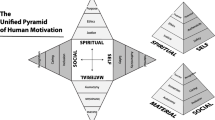Abstract
The paper deals with optimization of allocation of human resources among different activities. It is assumed that an individual is characterized by a “risk averse” and “constant return to scale” utility function of two variables: motivation to perform and reward following the performance. The individual is trying to maximize the utility by the best allocation of his time resources among the activities and by selecting the best portfolio of activities. Motivations are regarded, generally, as the product of the individual's preferences (i.e. subjective choice probabilities), productivities of time, output prices, performance and access probabilities, etc., while the rewards are profits or salaries connected with each activity. Satisfaction is defined as the maximum of utility attained for the optimum allocation and selection strategies. It is shown that for the given “equitable reward rate”, the optimum allocation and portfolio selection strategies can be derived explicitly and the derivation does not require the explicit knowledge of the individual's utility function.
Similar content being viewed by others
References
G.S. Becker, A theory of the allocation of time, Econ. J. 75(1965)413–517.
D. Fudenberg and J. Tirole, Moral hazard and renegotiations in agency contracts, Econometrica 58 no. 6(1990).
M.D. Intriligator, A probabilistic model of social choice, Rev. Econ. Studies 40(1973)553–560.
M.D. Intriligator, Probabilistic models of choice, Math. Social Sci. 2(1982)157–166.
R. Kulikowski, A. Jakubowski and D. Wagner, Interactive system for collective decision making, Syst. Anal., Modelling Simul. 3(1986).
R. Kulikowski, Access competition and disequilibrium in economic and political systems,12th Conf. on Macromodels '90 (1990).
R. Kulikowski, Equilibrium and disequilibrium in negotiation of public joint venture, in:System Analysis and Computer Science, Proc. 2nd Polish-Spanish Conf., Rozalin (Sept. 1990), ed. R. Kulikowski and J. Rudnicki (OMNITECH Press, Warszawa, 1990).
R. Kulikowski, Models for decision support in allocation of social resources, Control Cybern. 20(1991).
R. Kulikowski, Modelling of allocation of social resources and decision support,Proc. IIASA Workshop on User Oriented Methodology and Techniques of Decision Analysis and Support, ed. J. Wessels and A. Wierzbicki, Lecture Notes in Economics and Mathematical Systems (Springer, 1993).
R.D. Luce and H. Raiffa,Games and Decisions (Wiley, New York, 1959).
L.W. Porter and E.E. Lawler,Managerial Attitudes and Performance (R.D. Irwin, Homewood, IL, 1968).
J. Tirole,The Theory of Industrial Organization (MIT Press, Cambridge, 1988).
H.V. Vroom,Work and Motivation (Wiley, New York, 1964).
Author information
Authors and Affiliations
Rights and permissions
About this article
Cite this article
Kulikowski, R. A theory of motivation and satisfaction with application to decision support. Ann Oper Res 51, 263–281 (1994). https://doi.org/10.1007/BF02032376
Issue Date:
DOI: https://doi.org/10.1007/BF02032376




